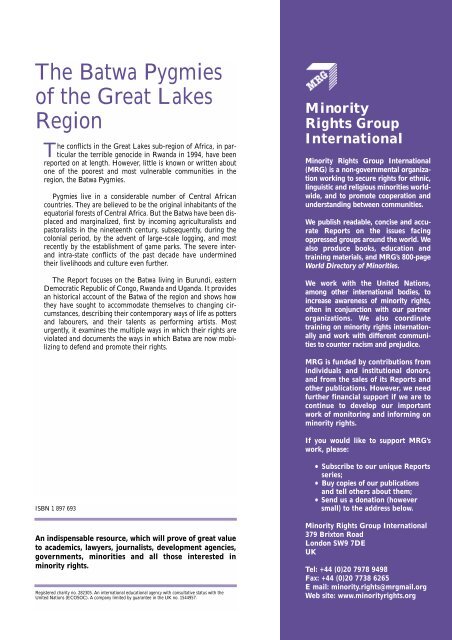The Batwa Pygmies of the Great Lakes Region - UNHCR
The Batwa Pygmies of the Great Lakes Region - UNHCR
The Batwa Pygmies of the Great Lakes Region - UNHCR
You also want an ePaper? Increase the reach of your titles
YUMPU automatically turns print PDFs into web optimized ePapers that Google loves.
<strong>The</strong> <strong>Batwa</strong> <strong>Pygmies</strong><br />
<strong>of</strong> <strong>the</strong> <strong>Great</strong> <strong>Lakes</strong><br />
<strong>Region</strong><br />
<strong>The</strong> conflicts in <strong>the</strong> <strong>Great</strong> <strong>Lakes</strong> sub-region <strong>of</strong> Africa, in particular<br />
<strong>the</strong> terrible genocide in Rwanda in 1994, have been<br />
reported on at length. However, little is known or written about<br />
one <strong>of</strong> <strong>the</strong> poorest and most vulnerable communities in <strong>the</strong><br />
region, <strong>the</strong> <strong>Batwa</strong> <strong>Pygmies</strong>.<br />
<strong>Pygmies</strong> live in a considerable number <strong>of</strong> Central African<br />
countries. <strong>The</strong>y are believed to be <strong>the</strong> original inhabitants <strong>of</strong> <strong>the</strong><br />
equatorial forests <strong>of</strong> Central Africa. But <strong>the</strong> <strong>Batwa</strong> have been displaced<br />
and marginalized, first by incoming agriculturalists and<br />
pastoralists in <strong>the</strong> nineteenth century, subsequently, during <strong>the</strong><br />
colonial period, by <strong>the</strong> advent <strong>of</strong> large-scale logging, and most<br />
recently by <strong>the</strong> establishment <strong>of</strong> game parks. <strong>The</strong> severe interand<br />
intra-state conflicts <strong>of</strong> <strong>the</strong> past decade have undermined<br />
<strong>the</strong>ir livelihoods and culture even fur<strong>the</strong>r.<br />
<strong>The</strong> Report focuses on <strong>the</strong> <strong>Batwa</strong> living in Burundi, eastern<br />
Democratic Republic <strong>of</strong> Congo, Rwanda and Uganda. It provides<br />
an historical account <strong>of</strong> <strong>the</strong> <strong>Batwa</strong> <strong>of</strong> <strong>the</strong> region and shows how<br />
<strong>the</strong>y have sought to accommodate <strong>the</strong>mselves to changing circumstances,<br />
describing <strong>the</strong>ir contemporary ways <strong>of</strong> life as potters<br />
and labourers, and <strong>the</strong>ir talents as performing artists. Most<br />
urgently, it examines <strong>the</strong> multiple ways in which <strong>the</strong>ir rights are<br />
violated and documents <strong>the</strong> ways in which <strong>Batwa</strong> are now mobilizing<br />
to defend and promote <strong>the</strong>ir rights.<br />
ISBN 1 897 693<br />
An indispensable resource, which will prove <strong>of</strong> great value<br />
to academics, lawyers, journalists, development agencies,<br />
governments, minorities and all those interested in<br />
minority rights.<br />
Registered charity no. 282305. An international educational agency with consultative status with <strong>the</strong><br />
United Nations (ECOSOC). A company limited by guarantee in <strong>the</strong> UK no. 1544957.<br />
Minority<br />
Rights Group<br />
International<br />
Minority Rights Group International<br />
(MRG) is a non-governmental organization<br />
working to secure rights for ethnic,<br />
linguistic and religious minorities worldwide,<br />
and to promote cooperation and<br />
understanding between communities.<br />
We publish readable, concise and accurate<br />
Reports on <strong>the</strong> issues facing<br />
oppressed groups around <strong>the</strong> world. We<br />
also produce books, education and<br />
training materials, and MRG’s 800-page<br />
World Directory <strong>of</strong> Minorities.<br />
We work with <strong>the</strong> United Nations,<br />
among o<strong>the</strong>r international bodies, to<br />
increase awareness <strong>of</strong> minority rights,<br />
<strong>of</strong>ten in conjunction with our partner<br />
organizations. We also coordinate<br />
training on minority rights internationally<br />
and work with different communities<br />
to counter racism and prejudice.<br />
MRG is funded by contributions from<br />
individuals and institutional donors,<br />
and from <strong>the</strong> sales <strong>of</strong> its Reports and<br />
o<strong>the</strong>r publications. However, we need<br />
fur<strong>the</strong>r financial support if we are to<br />
continue to develop our important<br />
work <strong>of</strong> monitoring and informing on<br />
minority rights.<br />
If you would like to support MRG’s<br />
work, please:<br />
• Subscribe to our unique Reports<br />
series;<br />
• Buy copies <strong>of</strong> our publications<br />
and tell o<strong>the</strong>rs about <strong>the</strong>m;<br />
• Send us a donation (however<br />
small) to <strong>the</strong> address below.<br />
Minority Rights Group International<br />
379 Brixton Road<br />
London SW9 7DE<br />
UK<br />
Tel: +44 (0)20 7978 9498<br />
Fax: +44 (0)20 7738 6265<br />
E mail: minority.rights@mrgmail.org<br />
Web site: www.minorityrights.org

















